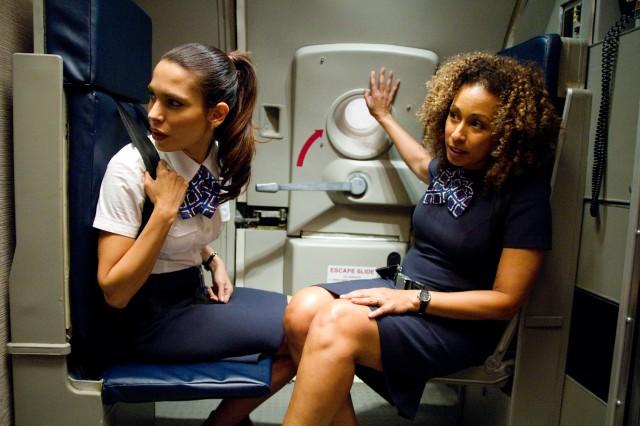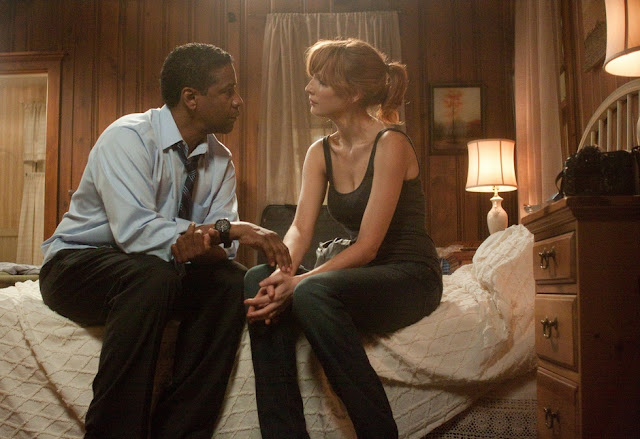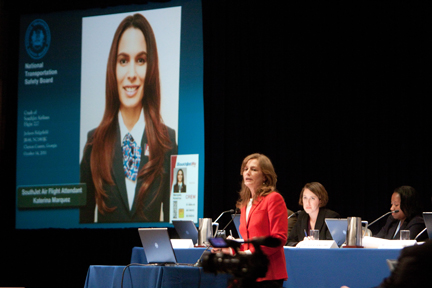Guest post written by Martyna Przybysz.
It is difficult to talk about strong female characters in a film, where one male actor overtakes the screen completely. Flight is indeed a tour de force performance by ever so excellent Denzel Washington. His protagonist, Captain Whip Whitaker is a pilot with many years of experience, and I am not necessarily referring to flying here – he’s become an expert on covering up his abuse of alcohol and drugs while on duty.
The opening scene finds Whip in a hotel room with his co-worker, and lover, an attractive and visibly younger than him flight attendant, Katerina, as they awake at the crack of dawn after what looks like a heavy night of alcohol and sex. With its brave nudity, and seeming objectification of a female body, the scene sets the tone of the film, or rather introduces us to our leading man – middle aged, evidently hedonistic, as well as arrogant and reckless in his approach to work, and, well, life. It is hard to shake off the feeling that Nadine Velazquez (known to some as ditzy and very likeable Didi from the CW Network’s show ‘Hart of Dixie’) fills in a stereotypical role of a young hot ethnic woman, and her nude body only accentuates the male lead’s aforementioned characteristics. It later becomes apparent that Whip has a tendency to go for younger women of different ethicities, but sadly, interracial relationship element never develops into a discourse here. It is the substance abuse that is placed at the heart of each relationship that Whip has with women in the film.
Katerina is not just any sexy Latina to Whip – she’s his partner in crime, a relapsing acoholic and a confidante of sorts, who covers up for Whip’s addiction, as well as hiding her own. His relationships with women for that matter are nothing but simple – as the director wants us to believe – but on screen they fall short of that ambition, and simply feel flat. What he has with Katerina is ended abruptly by the plane crash. At first glance, it’s a casual arrangement between the two, but we are later left wondering whether it is really just that. The cues are perhaps hidden in the way Whip’s friend, Charlie, looks at him when the NTSB delivers the news of two fatalities on the crew (one being ‘Trina’, as referred to by Whip), or it may be those few moments later when he quietly sheds a few tears when left alone in the room. And it is in relation to Katerina that Whip feels an enormous sense of guilt, that subsequently makes him break the vicious circle of lies: ‘Katerina Marquez did not drink the vodka, because I drunk the vodka’ he confesses.
There is also a cliched ex-wife figure lingering somewhere in the background. Deana (played by Garcelle Beauvais) is the ‘one that got away’, and the one who probably got hurt the most by Whip’s self-destruction. It’s one of those ‘he never got sober for her, so he lost her’ stories, and we have heard it all before. Then, there is a loving mother figure and a loyal colleague, Margaret (Tamara Tunie) – a woman who, in a seeming resignation, for years of working together with Whip watches as he drinks himself into oblivion. We never really find out whether she stays loyal or moral, and that is how yet another female figure in Whip’s life dissolves into the background. Finally, in the films most poignant scene, Melissa Leo, in a role that feels more like a cameo – she is only on screen for about 10 minutes – is Ellen Block, a NTSB’s Hearing Officer for Whitaker’s hearing. She is the only female character in ‘Flight’ that demonstrates some traces of depth – she is confident yet composed, direct but subtle in her approach. She already knows the answer to her questions, but could it be sadness and compassion that we see in her eyes as she looks at Whip as he admits to his crimes?
I would like to think that, as the only real ally that Whip has had in a female up to this point was a rather unconvincing Kelly Reilly’s Nicole. A character previously described by critics as “lyrically melancholic” and a “fragile heroin addict who embraces rehab and Whitaker at the same time, with patchy results.” And rightly so, because the central love story between the two is devoid of romance. Yes, there is an element of some kind of higher power bringing them together – they meet at the hospital stairwell, and after listening to a rather unconventional cupid, a dying cancer patient, Nicole says to Whip: ‘That was a trip, ha? He made me feel like, I don’t know, like you and me were the last people left on this planet’. There is also a theme of ‘sameness’, a common ground – her relationship with a needle is analogical to the one Whip has with a bottle of vodka. But Nicole is a few steps ahead of Whip, she has already faced her problems and is desperate to redeem her mistakes. It isn’t until the morning after she comes home to Whip pass out drunk on the floor (only to repositions his chin so that he doesn’t choke on his own vomit) that we learn that in fact, Nicole does have a bit of a personality. Or does she? It is all rather bleak, very underwritten, and however she may exhibit some hugely likeable (by nerds like myself) traces of being a melancholic artistic soul – it is all too dubious to put one’s finger on it, let alone relate to.
I did like how unobtrusive she remains throughout her slowly developing bond with Whip, however frail that bond may seem. On the other hand, that is what proves how self-absorbed she actually is (both of them are in fact!) – helping Whip is not really on her agenda, because she is the one looking for acceptance and love. It may be that she sees what she is looking for in him, because, and in spite of, the demons that they are both dealing with. This would then make this into a beautiful tale of love and redemption, but that is an entirely different movie, and it certainly wouldn’t be called Flight. However predictable in terms of the direction the relationship is heading towards (Whip fesses up, she visits in jail, all live happily ever after), I give kudos to the writer John Gatins for the effort put into creating an unconventional romantic subplot, however superfluous. And to the casting director for allowing us to indulge in the redhead beauty that Kelly is. It is still however disappointing that for a film with so many female characters the potential for developing at least one soulful female protagonist was pretty much wasted. I would like to blame it on Denzel and his breathtaking performance, but for the love of Denzel…may I blame the scriptwriter?
———-
Martyna Przybysz is a Pole, living in London, UK. She works in media and the arts. A sucker for portrait photography and a salted caramel cheesecake. This is her blog: http://martynaprzybysz.tumblr.com.




